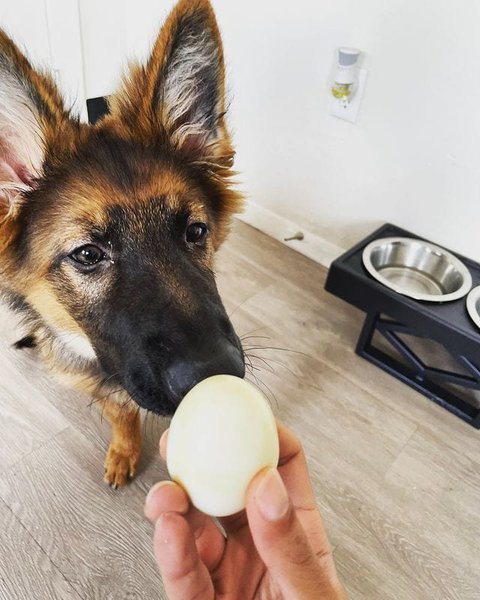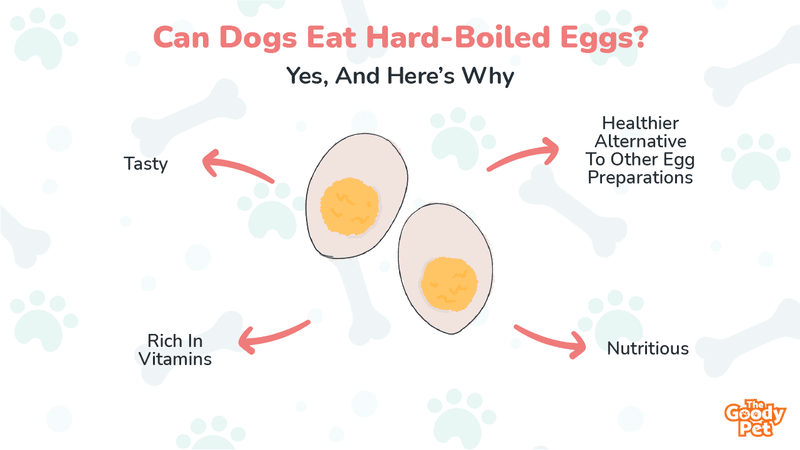Eating is a certified hobby for dogs. As a dog parent, it is your job to ensure that your furry best friend has access to tasty yet healthy snacks and treats to keep them going in between their main meals. Perhaps one of the most underrated options, in this case, is a nice, hard-boiled egg.
As long as dogs are not allergic to eggs, they can safely consume hard-boiled eggs. There are numerous perks of serving this up as a snack, with the rich nutritional profile being the most impressive of these pros.
Let’s take a look at a few other reasons why you not only can but should let your dog have the occasional hard-boiled egg. We shall also highlight a few situations where it may not be the best idea to let your dog have this tasty treat.
Without further ado, here is all that you need to know about feeding dogs hard-boiled eggs.
Can Dogs Eat Hard-Boiled Eggs?

Most dogs can eat hard-boiled eggs without any risk to their health. It is great as a snack for your hungry dog but could also be used as a part of the main meal or even as a treat reward during training.
Here are three main reasons why you should definitely consider adding hard-boiled eggs to your dog’s diet.
Nutritious
Hard-boiled eggs are a great source of macronutrients like protein and essential fatty acids that your dog needs for survival.
Boiled egg whites are particularly awesome for young puppies or very athletic dogs as the high protein content is what they need to develop and strengthen their muscles.
Boiled eggs are also rich in a series of micronutrients, including vitamin B12, folate, calcium, and zinc.
Tasty
Another reason to feed your dog with hard-boiled eggs is a simple fact that they are tasty just the way they are.
The best part is that their flavor is mild, which is especially handy if you are looking for a nutrient and calorie-packed snack for a dog suffering from an upset tummy and low appetite.
Healthier Alternative To Other Egg Preparations
Eggs, in general, are nutrient-rich and tasty whether they are scrambled, fried, or even omelets. Hard-boiled eggs stand out from most other egg preparations you could give your dog in that they are very healthy.
This is because the preparation doesn’t require unhealthy ingredients like oil or potentially toxic ones like onions or cheese.
Is It Safe To Give Your Dog A Hard-Boiled Eggs?

For the most part, it should be safe to give your dog a hard-boiled egg. However, there are certain risks that you should be aware of and so that you know potential side effects to look out for after feeding your dog this treat.
Here are some of the health and safety concerns when it comes to letting dogs eat hard-boiled eggs.
Choking Hazard
This is likely to happen to large dog breeds, especially if they eat the egg too fast and fail to chew properly or even at all. The egg could then get lodged in their airway, which could be life-threatening if not promptly addressed.
To avoid this, cut up the hard-boiled egg into bite-sized pieces appropriate for your dog’s size. Just don’t cut them too small, or you will have the same problem.
High In Cholesterol
The yolk of a hard-boiled egg is packed with fats, especially cholesterol. If your dog is dealing with health issues like heart disease, diabetes, or hormonal imbalance conditions like hypothyroidism, the high cholesterol could worsen the outcome of the condition.
High In Calories
A single hard-boiled egg has about 90 to 100 calories. While this may not be a lot at face value, it is important to remember that it would take a couple of these eggs to satisfy most dogs. Those calories add up and could put your dog at risk of developing obesity.
The best way to avoid obesity risks is to stick to serving the egg as a snack or an occasional treat, in which case you should stick to a single egg per serving.
Risk Of Allergic Reaction
Dogs can be allergic to eggs, in which case the yolk is the most likely offender as far as triggering reactions is concerned. For safety, it is best to avoid giving your dogs eggs altogether if you suspect that they are sensitive to the snack.
These allergies manifest in a number of ways but typically affect the dog’s digestive system and coat. Here are some of the most common signs you may notice if your dog is allergic to eggs:
- Bloating
- Abdominal discomfort
- Vomiting
- Diarrhea
- Excessive scratching
- Chewing on their coat
- Hives around the eyes, mouth, and ears
Do Hard-Boiled Eggs Give Dogs Gas?
Hard-boiled eggs are rich in methionine which is responsible for increased gas production in the dog’s stomach. This may result in bloating and flatulence which at its worst is just uncomfortable to be around.
However, for dogs prone to developing gastric dilatation volvulus, eating too many eggs could cause life-threatening bloat where the overextended stomach twists on itself. If not addressed promptly, this could cause death from lack of blood supply to the intestines.
It can all be avoided by practicing moderation when it comes to serving your dog hard-boiled eggs.
If you have a large dog breed, 1 to 2 hard-boiled eggs in a day should be more than enough. On the other hand, a smaller dog breed can have ½ of the hard-boiled egg every day.

How Should You Prepare Hard-Boiled Eggs For Your Dog?
The best way to prepare your dog’s hard-boiled egg is to boil it for 8 to 13 minutes. However, you could do a much shorter boil if you are sure that the eggs are sanitary, as undercooked eggs could be carriers for germs like Salmonella.
Make sure that the egg is served unseasoned. While this may seem counterintuitive, your dog’s palate can handle very little or no salt without ruining the pooch’s culinary experience.
Excessive seasonings like salt or pepper could trigger abdominal discomfort or worsen what was already there due to overeating the eggs or due to allergic reactions.






